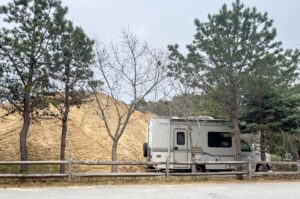TRURO — Eight years after the owners of Horton’s Camping Resort in Truro illegally cleared 11 acres of land abutting the Cape Cod National Seashore, a habitat restoration project is in its second spring. The restoration is a step the campground owners agreed to as part of a settlement reached with the town in 2021.

The Seashore’s Linzy French told the Independent in an email that the owners of Horton’s have a special use permit for the restoration work underway on adjoining Park-owned land. The work is expected to continue for “several years” to ensure new plantings are successful, French said.
At the same time, work is underway on a new wastewater system that will bring the campground into compliance with state standards for treatment of sewage.
The project has a convoluted history going as far back as 2004, when the Florida-based Adventure Bound Camping Resorts bought the North Truro Camping Area, according to the Cape Cod Times. Sometime after that purchase the town notified the company that it had to upgrade the way wastewater was handled on the property.
Adventure Bound notified the Mass. Dept. of Environmental Protection (DEP) last September that the construction of its long-delayed wastewater treatment facility was set to begin shortly, according to Fabienne Alexis, deputy press secretary at the DEP.
The new facility will replace several old septic systems and will reduce the net amount of nitrogen released into the watershed, according to Alexis.
A Clearcut Saga
Adventure Bound, which owns campgrounds in 11 states and Washington, D.C., acquired Horton’s Campground, the property next to its North Truro Camping Area, in 2012.
The founder of Adventure Bound Camping, Wayne Klekamp, did not respond to multiple requests for comment for this story. But according to a report written by company attorney Donald Nagle and obtained by the Independent through a public records request, Truro had already notified Adventure Bound that it had to upgrade the sewer system there before the company purchased Horton’s. That did not happen.
Once the company bought Horton’s, however, it sought and was issued a permit by Mass. DEP to treat the sewage produced at both campgrounds at a single wastewater treatment facility located at Horton’s.
Four years later, in 2016, Adventure Bound got to work on that, ordering the installation of a network of sewage pipes that would connect the two campgrounds. To make way for the pipes, Adventure Bound then authorized the clearing of over 11 acres of native vegetation and tree canopy and disturbing the habitat of the eastern box turtle population in the process.
Truro’s zoning board of appeals notified Adventure Bound that it had violated the town’s zoning laws by going forward — there had been no site plan review, and furthermore, the violation notice said, the property did not appear to be in compliance with its pre-existing nonconforming use. “It is clear that what was primarily a primitive tent camping area is being altered for full-service recreational vehicle use,” said the notice.
Adventure Bound had skipped another step as well. The company did not pursue authorization for its project from the Natural Heritage and Endangered Species Program, the agency that gives out special “conservation management permits” for any work that could affect the habitat of a protected species.
Much of Horton’s Camping Resort is mapped as “priority habitat” by the Mass. Div. of Fisheries & Wildlife because of the eastern box turtle population. The turtles have been designated a species of special concern under the Mass. Endangered Species Act, according to Mass Audubon.
Horton’s challenged the zoning board’s cease and desist order in court, and five years later, in 2021, the parties settled the dispute.
Adventure Bound Camping Resorts agreed to several conditions for future construction, according to the settlement.
Those include the current restoration project and a requirement that active monitoring of it continue for five years. Other requirements include the removal of invasive species and that a reviewer hired by the town be allowed to inspect the property whenever necessary.
Adventure Bound Camping Resorts came to a separate agreement with the Natural Heritage and Endangered Species Program to receive an after-the-fact conservation management permit, according to the report written by Nagle.
As a part of that deal, the company had to implement a “turtle protection plan” before starting any new construction. Adventure Bound also donated nine acres of forested land to the Truro Conservation Trust and made a $95,000 donation to the Nature Conservancy for its Eastern Box Turtle Conservation Fund.
Finally, the company agreed never to seek an increase in the number of campsites at either Horton’s Camping Resort or the North Truro Camping Area. Horton’s Camping Resort has 218 campsites, while its North Truro Camping Area has 330.
Adventure Bound also agreed to limit the camping season to April 1 to Dec. 1, except for employees and their families who live on the property year-round.
No Room at the Campground
Today, even as the restoration and the construction of the treatment facility slowly move along, camping spots at Horton’s are in high demand.
An employee confirmed that hundreds of people are currently on the waitlist for a campsite. Horton’s provides short-term and seasonal rentals for RVs and tent campers.
As the Independent has reported, campgrounds including Horton’s are increasingly being looked to as a temporary housing option for seasonal workers or permanent residents between leases. But besides their low availability, it’s hard to assess the rates for these spots because they vary widely depending on the length of rental, the inclusion of utilities, and size of the rented space.
An ad placed in the “Seeking Provincetown Housing/Rentals” Facebook group in December listed a spot for an RV at Horton’s from April to November for $9,500 — although the post noted that the price might be negotiable. That fee would cover water, sewage, trash, cable, and picnic table access. It does not include the cost of the RV itself.
Coastal Acres Campground in Provincetown also has a long waiting list dating back to 2019, according to an email message from manager Anna Kuzia. Like Horton’s, Coastal Acres provides spots for RVs and tents. And like Horton’s, Coastal Acres does not list specific prices for seasonal rentals on its website.
Unlike Horton’s and Coastal Acres, Dunes’ Edge Campground in Provincetown does not allow campers to stay more than two weeks. Dunes’ Edge does not keep a waitlist, but much of the summer season rental spots have already been taken, according to its online reservation system.
Rentals at Dunes’ Edge can cost anywhere from $55 to $149 per night, depending on the amenities included.



